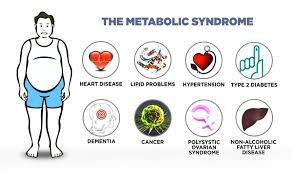Definition
Metabolic syndrome comprises five medical conditions or factors that collectively elevate an individual's susceptibility to cardiovascular disease, stroke, type 2 diabetes mellitus, and various other health complications. Metabolic syndrome is diagnosed in individuals who exhibit the presence of three or more of the subsequent symptoms:
- High blood pressure
- High blood sugar
- A large waist circumference is due to excess body fat around the waist
- High levels of triglyceride fats in the blood
- Low levels of "good" cholesterol (HDL) in the blood
The presence of only one of the aforementioned conditions does not qualify an individual as having metabolic syndrome. Nevertheless, the coexistence of the aforementioned conditions in a single individual raises the risk of developing more severe complications, including cardiovascular disease, nervous disorders, and insulin resistance.
The prevalence of metabolic syndrome is currently on the rise. If a doctor diagnoses you with metabolic syndrome, you must implement lifestyle modifications to impede and prevent disease progression.
Read more on high blood sugar levels here.
Causes
Metabolic syndrome is strongly associated with obesity, physical inactivity, and hereditary predispositions. Excessive fat accumulation in the body can lead to tissue diseases and result in insulin resistance, a condition associated with regulating blood sugar levels.
The digestive system will ordinarily convert the food you ingest into a variety of smaller nutrient forms, including fatty acids, glucose from carbohydrates, and amino acids from protein. Blood sugar or glucose, is required for cellular energy production and the execution of numerous functions. Despite this, the glucose remains in the bloodstream and is unable to penetrate the cells. The pancreas, an organ located in the stomach, is responsible for producing insulin, a hormone that facilitates the uptake of sugar into cells for energy production.
Insulin resistance occurs when cells no longer respond normally to insulin, preventing sugar from entering the cells easily. To regulate the blood sugar, the body continues to secrete additional insulin as a consequence of the elevated levels. Problems may also develop in the blood vessels and nerves over time.
Risk Factors
While certain individuals may have a genetic predisposition to metabolic syndrome, the majority of cases are attributed to lifestyle choices or other contributing factors.
The following factors significantly elevate the risk of developing metabolic syndrome:
- Age
As you age, the risk of developing metabolic syndrome increases. Metabolic syndrome impacts over 40% of individuals within the age range of 60 to 70 years.
- Race and gender
Black men have a lower risk of metabolic syndrome than white men, whereas black women have a higher prevalence of metabolic syndrome compared to white women.
- Obesity
A higher body mass index, particularly abdominal adiposity, can elevate the risk of metabolic syndrome.
- Insulin Resistance
This occurs when the body is unable to effectively use insulin. Certain individuals have a genetic predisposition to insulin resistance.
- Diabetic History
Individuals who have a family history of type 2 diabetes or women who have experienced gestational diabetes are at increased risk of developing metabolic syndrome.
- Other diseases
If you have experienced the following, your risk of developing metabolic syndrome is increased:
-
- Non-alcoholic fatty liver is a condition characterized by the accumulation of fat in the liver in individuals who do not consume alcohol.
- Polycystic ovarian syndrome is characterized by the presence of tiny sacs in the ovaries that lead to an imbalance in reproductive hormones.
- Sleep apnea is a sleep disorder characterized by repetitive collapse of the upper airway.
Symptoms
The majority of disorders associated with metabolic syndrome lack conspicuous indications or symptoms. Typically, health complications associated with metabolic syndrome manifest gradually.
A prominent indicator is an enlarged abdominal circumference. Indicators of diabetes include elevated blood sugar levels, persistent appetite and thirst, excessive urination, fatigue, visual impairments, and nervous system disorders.
Diagnosis
Metabolic syndrome is identified when at least three of the following conditions are present:
- Central obesity
This condition is characterized by abdominal fat accumulation. The health professional will measure your waist circumference. This condition is characterized by a waist circumference in men exceeding 40 inches (102 cm) and in women exceeding 35 inches (89 cm).
- High triglyceride levels
If your blood triglyceride levels are equal to or greater than 150 mg/dL, or if you consume medication to reduce triglyceride levels,
- Low HDL cholesterol levels
Men have HDL values below 40 mg/dL and women have levels below 50 mg/dL or are on medication for low HDL cholesterol.
- High blood pressure
If your blood pressure is 130/85 mmHg or higher, or if you are on antihypertensive medication,
- Elevated fasting blood glucose levels
Fasting blood sugar level of 100 mg/dL or higher, or currently on medication for high blood sugar.
Management
For individuals diagnosed with metabolic syndrome, practicing healthy lifestyle modifications can avert significant health issues, including heart attack or stroke. You can perform the following tasks:
- Routine exercise
Experts advise engaging in a minimum of 150 minutes of moderate-intensity exercise weekly. Seek opportunities to boost physical activity, such as opting to walk for short distances instead of driving, or using stairs instead of escalators or elevators.
- Weight loss
Reducing body weight by 7% can decrease insulin resistance, lower blood pressure, and reduce the risk of diabetes. Any degree of weight loss will be advantageous. It is crucial to sustain your weight if you have experienced weight loss. If you are struggling to lose weight and maintain it, consult your doctor regarding the therapy alternatives to assist you.
- Healthy diet
Opt for a healthy diet, such as the DASH (dietary approaches to stop hypertension) diet or the Mediterranean diet. Prioritize ingesting veggies, fruits, high-fiber whole grains, lean protein, and nuts. Healthy dietary patterns typically include restricting sugary beverages, alcohol, and foods rich in salt, sugar, and fats, particularly saturated and trans fats.
- Stop smoking
Stop smoking; it will greatly enhance your general well-being. Consult your doctor if you require assistance in stopping smoking.
- Stress management
Engaging in physical activity, meditation, yoga, and similar programs can assist in managing stress and enhancing both your emotional and physical well-being.
If significant lifestyle modifications like diet and exercise do not suffice, your doctor can suggest medication to manage your blood pressure, cholesterol, and blood sugar levels. Follow your doctor's advice in the letter to manage your condition.
Complications
Metabolic syndrome can elevate your chances of experiencing:
- Type 2 diabetes
Failing to adopt lifestyle adjustments to manage excess weight could lead to the development of insulin resistance, resulting in elevated blood sugar levels. Insulin resistance can ultimately lead to the development of type 2 diabetes mellitus. Untreated diabetes can lead to issues in the eyes, nerves, or kidneys.
- Cardiovascular disease
Elevated blood cholesterol levels and hypertension can lead to the accumulation of plaque in your arteries. As the number of plaques increases, they can constrict and stiffen the blood vessels, impeding the flow of blood to the body's cells. Consequently, the likelihood of experiencing a heart attack or stroke may rise.
- Fatty liver
This medical condition is occasionally associated with liver inflammation, known as non-alcohol-related steatohepatitis (NASH). Untreated NASH can lead to cirrhosis and liver failure.
Prevention
Committing to a healthy lifestyle throughout one's life can help prevent the development of metabolic syndrome. Components of a healthy lifestyle:
- Engage in a minimum of 30 minutes of physical activity most days of the week.
- Incorporate a diet rich in vegetables, fruit, lean protein, and whole grains.
- Avoid consuming high levels of saturated fat and salt in your diet.
- Keep your body weight at an optimal level.
- Avoid smoking.
- Decrease alcohol intake.
When to see a doctor?
If you are aware that you have at least one component of metabolic syndrome, consult your doctor about the necessity of testing for other components of the syndrome.
Looking for more information about other diseases? Click here!
- dr Hanifa Rahma
Metabolic syndrome (2021) Mayo Clinic. Mayo Foundation for Medical Education and Research. Available at: https://www.mayoclinic.org/diseases-conditions/metabolic-syndrome/symptoms-causes/syc-20351916 (Accessed: February 17, 2023).
What is metabolic syndrome? - american heart association (2021). Available at: https://www.heart.org/-/media/files/health-topics/answers-by-heart/what-is-metabolic-syndrome.pdf (Accessed: February 17, 2023).
Metabolic syndrome: Causes, symptoms, diagnosis & treatment (2019) Cleveland Clinic. Available at: https://my.clevelandclinic.org/health/diseases/10783-metabolic-syndrome (Accessed: February 17, 2023).












